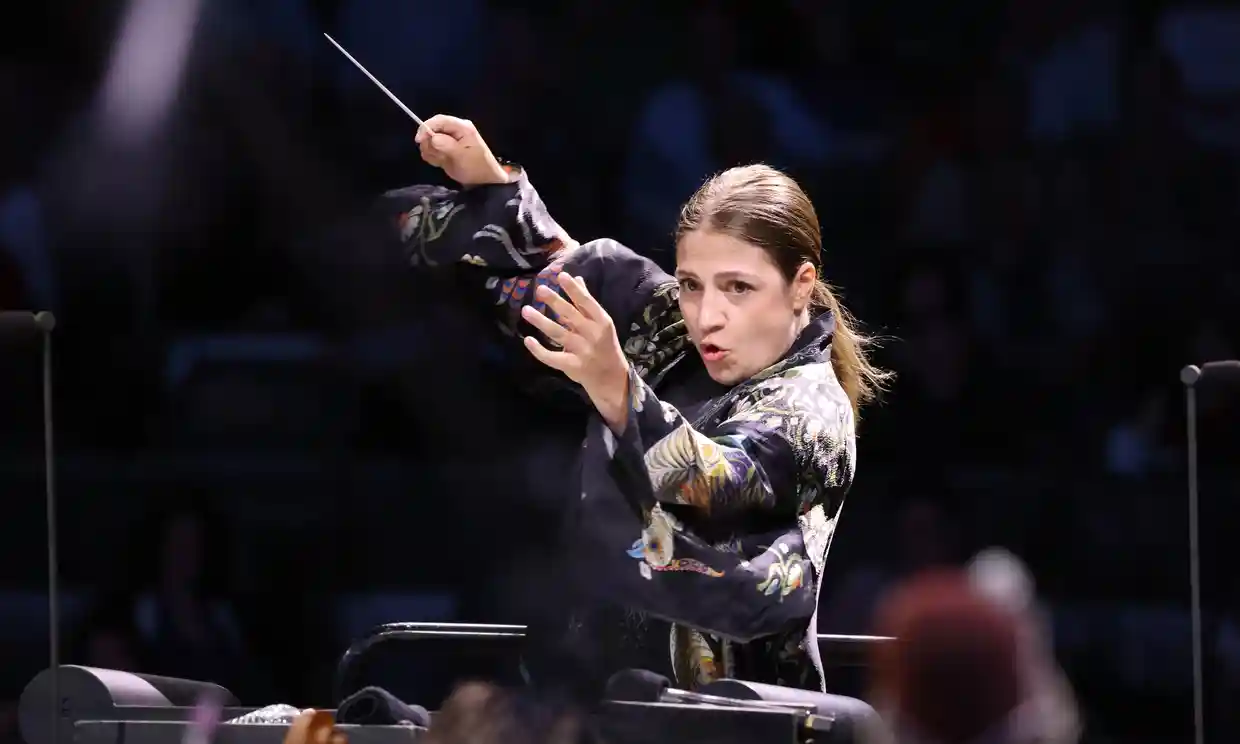Female conductors to open and close BBC Proms for first time
by Anastasia

For the first time in its history the BBC Proms season will be opened and closed by female conductors, as the festival moves towards gender equality.
The opening and closing nights will be led by Dalia Stasevska and Marin Alsop respectively, two of 10 women conducting concerts this year, three making their Proms debut.
“We’re moving in the right direction towards equitable representation,” said the Proms director, David Pickard, “but it’s a slow process.”
Meanwhile, 11 of this year’s 21 premieres are by female composers, including the Ukrainian Bohdana Frolyak and the master of the king’s music, Judith Weir, and a third of the festival’s 84 concerts include works by women. “This is hugely advanced on the figures of even 10 years ago. Is it enough? No, but the motivation to change these things is enormous,” said Pickard.
Other firsts for the Proms this year include a mini-festival at Sage Gateshead, which will host six concerts over a July weekend. Performers will range from the acclaimed singer-songwriter Self Esteem to the US countertenor Reginald Mobley.
There will also be chamber music concerts in towns across the UK including Dewsbury, Derry and Great Yarmouth. A concert devoted to Portuguese Fado music, a celebration of Northern Soul, and the UK premiere of György Kurtág’s debut opera Endgame, written by the 97-year-old Hungarian when he was 93, are among other Proms firsts.
But traditionalists can sleep easy: the Last Night of the Proms will be in place in its reassuringly familiar format, with Rule, Britannia! and Land of Hope and Glory. The cellist Sheku Kanneh-Mason and soprano Lise Davidsen, due to perform at last year’s event, which was cancelled because of the death of the queen, have been rebooked, and James B Wilson’s 1922, written to celebrate the 2022 centenary of the BBC, will finally be premiered.
“The Last Night is part of the Proms tradition and people love it,” said Pickard. “There are going to be strong feelings either way about it, but it is just one of 72 concerts in the Royal Albert Hall in which we are trying to reflect a whole range of music; the Last Night is just one part of that.”
Another familiar feature that will be more universally celebrated is the presence of the BBC Singers. The group, whose closure was announced in March, only for the decision to be reversed weeks later, are absent from the printed guide but will be performing in five concerts across the season.
“The original decision [to close the BBC Singers] was very close to us going to press and so we decided it was unwise to include them,” said Pickard. “Since the guide went to press things have changed and I’m delighted. They play an important role every season; this year will be no different.”
Nicholas Collon with the Aurora Orchestra at 2022’s Proms. Requiem to revolution via Aeneas and Kafka’s Earplugs: our 10 Proms picks Read more Sam Jackson, the new controller of BBC Radio 3, acknowledged that the past few months had been challenging. “This is a time where the BBC’s classical music offering is under intense scrutiny and rightly so, because it’s really, really important. I am relieved and pleased that we now are looking to secure a sustainable future for BBC Singers and that we’re working constructively with the Musicians’ Union on the future of our English orchestras,” he said.
No UK or international performer had pulled out of the Proms – or threatened to do so – because of the proposed cuts, said Pickard, who acknowledged that financial pressures meant that “we are all trying to do more with less money.”
One event that will be doing more with more is the first ever complete Proms performance of Berlioz’s epic, five-act five-plus-hour opera Les Troyens, with John Eliot Gardiner conducting a cast that includes Michael Spyres and Alice Coote.
Visiting international orchestras will include the Boston Symphony Orchestra and the Budapest Festival Orchestra, whose audience choice programme invites concertgoers to vote live for any of 250 works to be performed.
Notable debuts include the German horn virtuoso Felix Klieser who was born without arms and plays with his left foot, and the young French pianist Alexandre Kantorow, winner of the Grand Prix in the Tchaikovsky competition and hailed as “Lizst reincarnated”.
With all the firsts, and the tradition, there is also a notable last. Sir Simon Rattle will make his final UK appearance with the London Symphony Orchestra in his role as music director; poignantly, he will perform Mahler’s Ninth, his last completed symphony.
Elsewhere, the Horrible Histories team will unite with English National Opera’s Chorus and Orchestra for ’Orrible Opera and, in the contemporary programme, Jon Hopkins performs with the BBC Symphony Orchestra and Rufus Wainwright premieres Want Symphony, orchestral arrangements of his lauded albums Want One and Want Two.
Ticket prices range from £9 to £72 for every concert bar the Last Night, and 1,000 £8 tickets are available each day to stand in the arena or up in the gallery – the price of sandwich and a cup of coffee, as Pickard points out.
BBC TV will broadcast 24 concerts and all 84 concerts will be live on BBC Radio 3, and available on BBC Sounds for a year.
Jackson emphasised the impact, ambition and reach of the festival. “We need to be delivering value for money for the licence fee payer across the UK, who fund what we do. I want us to be having a greater impact beyond our usual stomping grounds. And so, of course, that means putting on a fantastic Proms season of concerts at the Royal Albert Hall … but it also means looking beyond our core and looking at those audiences that we don’t currently reach perhaps as effectively as we could.”
Source: https://www.theguardian.com/



